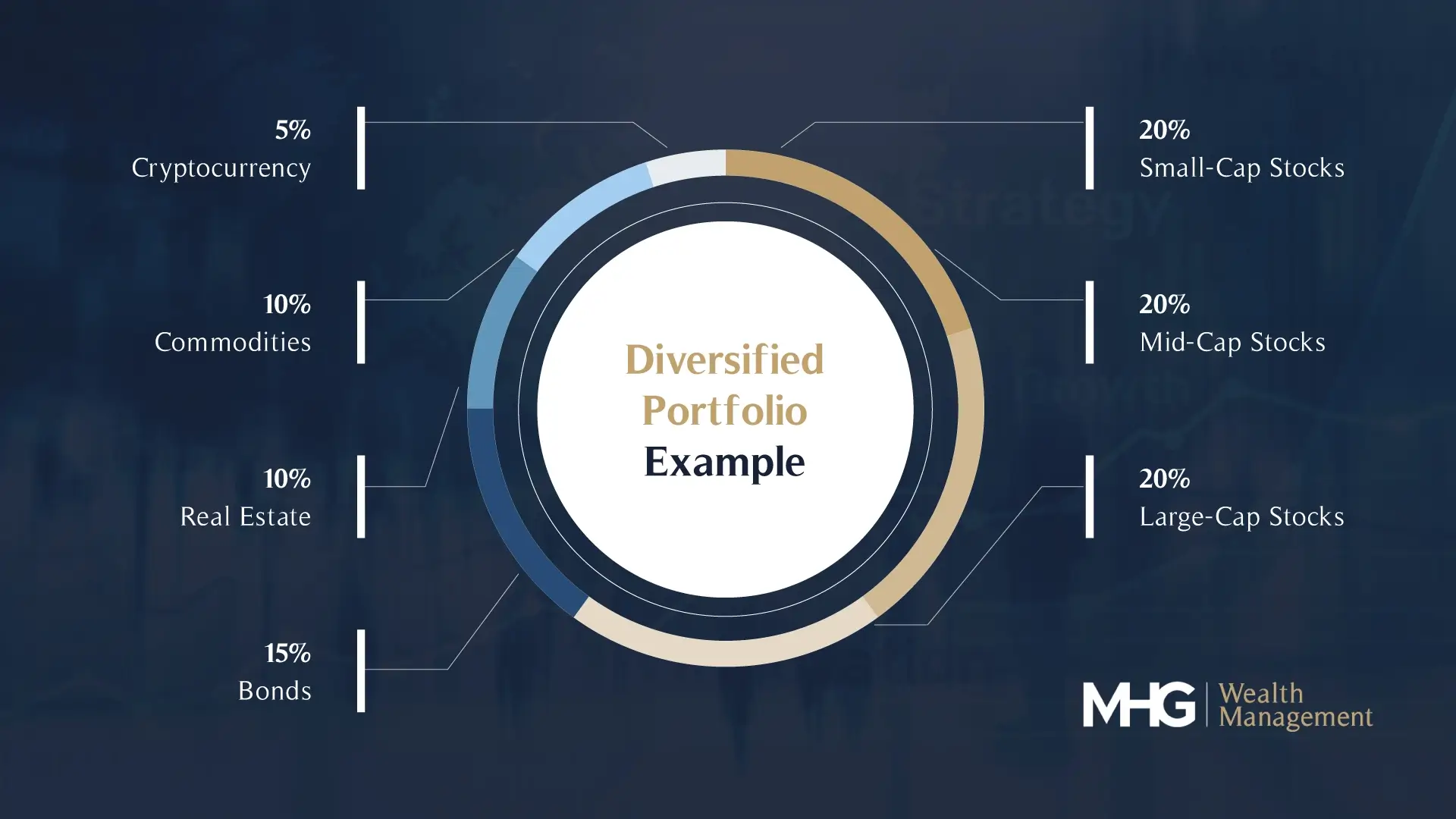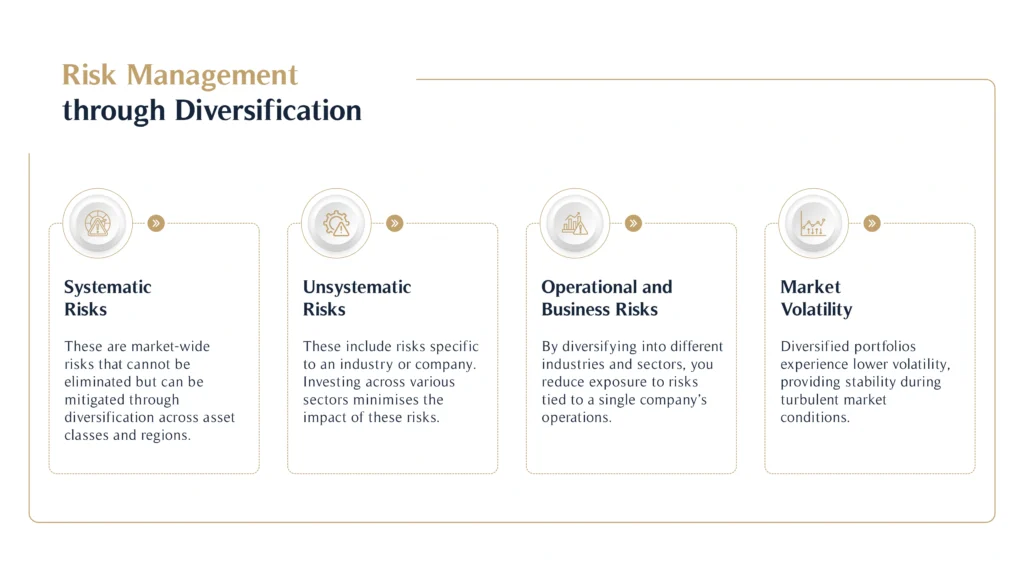Investing is as much about managing risks as it is about seeking returns. One of the most effective ways to safeguard your wealth while pursuing growth is through diversification. At its core, diversification is the strategy of spreading your investments across a mix of asset classes, industries, geographical regions, and even alternative assets like real estate or commodities. By doing this, you reduce your exposure to asset-specific risks and market volatility, giving your portfolio the resilience to weather economic downturns.
Whether you’re a seasoned investor or just starting out, understanding diversification is crucial to achieving your financial goals. In this article, we’ll break down the benefits and challenges of diversification, explore various portfolio strategies, and discuss how it plays a critical role in portfolio management and risk reduction.
What is diversification?
Diversification means spreading your money around multiple investments. You might have seen phrases like ‘investment diversification’, or ‘asset allocation’, or ‘diversified portfolios’. It’s an important method for achieving your financial goals, whilst reducing investing risks.
Here are four investment diversification strategies to consider:
One: you could buy stocks in different sectors. Buy some in industrial companies, and some in technology firms. You could also buy shares in utilities (people always need water and electricity) and complement these by investing in firms producing luxuries like expensive cars or electronics. Do this and you’ll be partly diversified.
Two: you might invest in different assets. Spread your investment across stocks and bonds, and put money in gold or real estate. You might also dabble in cryptocurrency or other alternatives.
Three: invest in different company types. In boom times, investors might throw money at small start-ups, but during tougher years, they might prefer well-established firms. Put your money in both and you can fend off the worst market fluctuations.
Consider how long you’ll hold your investments. Can you balance your short-term investments with long-term ones?
Four: geography is another route to investment portfolio diversification. Markets in North America and Western Europe will behave in one way, but emerging markets like Brazil or India will do their own thing. A boom in one region can balance out a slump elsewhere.
Advantages of diversification in investing
Diversified investment portfolios can weather short-term volatility. Done right, diversification can help you earn more and reduce your risk of losing money.
Let’s consider some examples. An economic slump might slash the value of jewellery companies and construction firms. However, utilities and consumer staples firms (selling food and beverages) can hold their own during rough times. Invest in both and you’ll make your investments more resilient. Those utilities will stop your portfolio tumbling too far.
Some sectors rise when others sink. If there’s bad news for airlines, such as a long pilot’s strike, airline stocks might fall. That strike would boost railway companies. Buying both airline and railway stocks would help you dodge risk.
If you only invest in one sector, you risk missing out on booms elsewhere. You might be tempted to throw everything into customer staples like food and beverage providers, but what if some new technology earns serious money? Any companies involved could see major rises in their stock prices, and shouldn’t you benefit from that rise?
Diversification makes you more likely to benefit.
Markets go through cycles. They often rise and peak before falling. If you keep your investments fluid, you can invest in a sector which has just had a fall, and benefit from future rises.
This is a complex area, so we recommend speaking to one of our experienced financial advisors to offer you the best diversification advice.
Disadvantages of diversification in investing
Diversification sounds wonderful, but you must diversify in the right way.
You have several questions to consider. What percentage of your portfolio should go into which asset? How much time do you have to plough through a company’s financial report? How can you buy shares in an overseas company? How might you make sense of alternative investments? It all takes loads of research.
You’ll need to keep abreast of market changes. What looks like a brilliant investment now might bring you trouble soon. Make a wrong prediction and your money could vanish.
It’s also easy to miss out on future booms. Developing economies like Indonesia or Mexico might surge, and money you’ve invested elsewhere might give humdrum returns.
Diversifying your portfolio can reduce investment risks, but if you’ve cast a wide net, you might have bought some risky individual assets. You might also pay out a small fortune in transaction costs.
Finally, even diversification won’t give you a cast-iron guarantee against losing money. The 2008 financial crisis saw most stocks fall. Inflation, exchange rates, political troubles, all can cause you grief, even if you’ve diversified well.
But the right advice can protect your money.
Challenges of Diversification
While diversification is widely regarded as a cornerstone of sound investing, it’s not without its hurdles. Understanding these challenges can help you make more informed decisions.
Over-diversifying can lead to diminished returns. If your portfolio holds too many investments, the gains from high-performing assets may be diluted by the mediocre performance of others. For instance, allocating equally to both high-risk growth stocks and low-yield bonds might limit your potential gains.
Managing a diversified portfolio requires considerable effort. You’ll need to monitor multiple assets, track market trends, and evaluate factors like a company’s performance or regulatory risks. Moreover, transaction fees, especially for international investments, can add up, eating into your returns.
Even with diversification, your portfolio is still subject to market risks. During events like the 2008 financial crisis, nearly all asset classes experienced declines. This highlights the importance of combining diversification with other risk management strategies.
For investors relying on fund managers, the success of their portfolio often depends on the manager’s ability to generate alpha and outperform the market. Poor management decisions can negate the benefits of diversification.
Want to learn more about balancing risks and returns through alternative investments? Read: How to Invest in Alternative Investments.
Diversification Strategies
Strategic diversification is key to building a resilient investment portfolio. Allocate your investments across different asset classes, such as equities, fixed-income securities, and alternative investments like commodities or real estate. This ensures your portfolio isn’t overly dependent on one type of asset.
Invest in markets across various geographical locations to spread risk. For instance, balancing exposure to developed markets like the US (S&P 500) with opportunities in emerging markets can provide a broader base for growth.
Include a mix of fixed-income securities like government bonds, corporate bonds, and target-date funds. These assets offer stability and predictable returns, complementing riskier investments.
Reduce industry-specific risks by investing across multiple sectors. For example, allocate funds to both technology and healthcare to balance growth potential with stability.
Apply smart beta strategies. These involve selecting investments based on specific factors like volatility or growth potential rather than traditional index tracking. Smart beta strategies offer a tailored approach to diversification.
For detailed insights into alternative investments and their role in diversification, check out our guide: Alternative Investments vs Traditional Investments.
Diversification in Asset Classes
Investing across multiple asset classes creates a robust and balanced portfolio.
Equities: A mix of growth stocks for capital appreciation and value stocks for stability ensures that your portfolio benefits from market highs while weathering downturns.
Fixed-Income Securities: Diversify within bonds by considering credit quality, maturity lengths, and type of issuer. Government bonds offer security, while corporate bonds provide higher yields.
Alternative Investments: Adding assets like real estate, commodities, or gold funds can hedge against inflation and market volatility.
Geographical Allocation: Spreading investments across regions reduces exposure to localised economic challenges.
Risk Management through Diversification
Diversification is a powerful risk management tool, addressing both systematic and unsystematic risks.
Systematic Risks: These are market-wide risks that cannot be eliminated but can be mitigated through diversification across asset classes and regions.
Unsystematic Risks: These include risks specific to an industry or company. Investing across various sectors minimises the impact of these risks.
Operational and Business Risks: By diversifying into different industries and sectors, you reduce exposure to risks tied to a single company’s operations.
Market Volatility: Diversified portfolios experience lower volatility, providing stability during turbulent market conditions.
A well-diversified portfolio acts as a shield against the unpredictable nature of markets, ensuring consistent growth and safeguarding your wealth.
Seeking expert advice on diversification
Diversification isn’t a magic potion. A diverse investment portfolio has the power to reduce your risk, and it’s almost always part of a successful portfolio, but diversification needs to be done right.
Its advantages don’t scale well. Go from owning 1 stock to owning 20 and you’ll see benefits. However, if you move from owning 100 stocks to 200, you won’t see much improvement. Your portfolio will be more complicated and will cost more to manage.
Risk diversification means buying different assets, and you’ll need effective advice before buying the right assets.
Speaking to one of our expert financial advisors can help you make the right financial decisions and get investment diversification working for you. Contact us today for a tailored, diversified plan.







